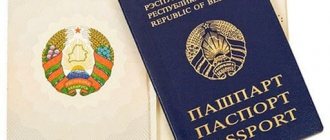The concept of citizenship, methods of acquiring and losing it
Citizenship is a personal legal connection between a person and the state, characterized by the presence of mutual rights and obligations.
Acquisition of citizenship is the acquisition by a foreigner, stateless person (stateless person) of the status of a citizen of the Russian Federation on the grounds and in the manner provided for by Russian legislation on citizenship.
Russian citizenship is acquired:
- by birth;
- as a result of admission to citizenship;
- as a result of restoration of citizenship;
- by choosing citizenship (option) and on other grounds provided for by international treaties of the Russian Federation and the USSR;
- on other grounds provided for by the Citizenship Law.
You can consider each of the above points in more detail:
Citizenship by birth is filiation. In this case, two principles apply:
- The principle of blood (a child receives Russian citizenship if: both parents are citizens of the Russian Federation or one of the parents is a citizen of the Russian Federation, and the other is stateless or missing)
- The principle of soil (a child receives citizenship of the Russian Federation if: the child was born on the territory of the Russian Federation, but the state, whose subjects are his parents, does not give the child citizenship or, if the parents of the child discovered by social services do not appear within a six-month period.
There is also a rule that combines these two principles: a newborn is recognized as a citizen of the Russian Federation if one of his parents had Russian citizenship and the other was a foreigner, and the fact of the child’s birth was recorded in the Russian Federation.
Acceptance of citizenship is a rather complicated procedure. The acquisition of citizenship by a person at will is called naturalization. The procedure for acquiring Russian citizenship is regulated by the Law “On Citizenship”. A stateless person or a foreign national can obtain Russian citizenship only upon receipt of permission from the President of the Russian Federation. Before the process of obtaining citizenship is launched, it is necessary to live in the country for five years, but for some categories of persons there is a simplified system in which the period of stay can be reduced to a year.
Restoration of citizenship is possible for persons who previously possessed it. Restoration of citizenship follows the same scheme as its acquisition, however, the period of permanent residence is reduced to three years. There is also a simplified procedure for the restoration of citizenship, defined in articles 13 and 14 of the Law “On Citizenship”.
When the state borders of a state change, the population of the territory has the right to choose which country to be a citizen of. This is called an option. The option procedure is regulated by international treaties of the states whose borders have changed.
As for the loss of Russian citizenship, termination of citizenship may occur as a result of renunciation of the citizenship of the relevant country or renunciation of citizenship.
The reasons for deprivation of citizenship are: 1) acquisition of citizenship by fraud, on the basis of knowingly false information, false documents; 2) if the person was engaged in anti-state activities in favor of a foreign state and thereby harmed the interests of the state; 3) if a person is convicted of a crime against state security. Persons deprived of citizenship are subject to deportation from the country - expatriation.
Citizenship of the Russian Federation is terminated: 1) due to renunciation of citizenship - (Article 23 of the Law on Citizenship) - this is its loss by a person of his own free will by: filing a petition or in a simplified manner, if registered in the territory of another state or children or wife have a different citizenship ); 2) as a result of the cancellation of the decision on admission to citizenship - (Article 24 of the Law on Citizenship) - applies to a person who acquired citizenship of the Russian Federation on the basis of knowingly false information and false documents. Cancellation of the decision on admission to citizenship of the Russian Federation is possible within five years after admission.
3) by choosing citizenship (option) when changing the nationality of the territory - (Article 21 of the Law on Citizenship) - in the event of a change in the borders of the state, a person living on the territory himself chooses which state he will be a citizen of; 4) on other grounds provided for by the Law - the Law on Citizenship refers, for example, to the termination of citizenship of the Russian Federation for children under the age of 14 years, whose parents acquired a different citizenship (Part 1, Article 26)
Acquisition and loss of citizenship
In accordance with international legal standards! Every person has the right to citizenship (Part 1, Article 15 of the General Declaration of Human Rights). Although the legislation of modern states establishes a variety of criteria, the most common grounds are the acquisition of citizenship by birth or by patent.
In all countries, the legislator establishes the possibility of granting citizenship by birth, although at this age a person cannot determine his preferences. This approach is based on the presumption of membership, according to which, at the birth of a certain person, there is a high probability that he will show loyalty to the state in which he was born4.
1 For more details, see: Braber K.
S11Lgeph1ir aps! Mayupboos! t Rgapss ups! Sspshtu. Naguags!, 1992. R. 82.
2 NayopaShu aps! 1n1sgpaYopa1 Ba* t Ayp Regrss11US. Na#ie, 1990. R. 256 - 260. th' Article 1 of the Convention Governing Certain All Matters Connected with Questions of Nationality, 1930 1| 4 Bryuber K.
Or. s11. R. 27
§ 2. Acquisition and loss of citizenship 111
The granting of citizenship by birth is based on two principles - “right of blood” (|I5 zap^iish), i.e. birth from a parent or parents who are citizens of a particular country, and “the right of the soil” ((from the zone), i.e. birth on the territory of a certain country. Preference is given to the “right of blood” - community by virtue of origin - by states seeking to preserve the ethnocultural unity of the people , traditionally living in a certain territory (Germany, Switzerland).In immigration states (USA, Canada) it is believed that the “law of the soil” helps to form a new cultural-state community, i.e. in this case citizenship is considered as a kind of territorial concept.
The legislation of most states enshrines mixed approaches - a combination in one form or another of “law of blood” and “law of soil”. In the Russian Federation, it is possible to acquire citizenship by birth for children, one of whose parents is a citizen of Russia, as well as for children born on the territory of our country if their parents are unknown or stateless. In addition, it is possible to grant Russian citizenship to children of foreigners if the parents’ state of origin does not grant their children their citizenship.
In almost all European countries, the legislator establishes equal chances for father and mother to pass on their citizenship to the child. However, in a number of states, the legal status of a child is still determined by the father (Thailand, India, Bangladesh). According to the laws of these countries, a child can acquire the mother's citizenship only if the father is stateless or unknown.
In accordance with the International Covenant on Civil and Political Morals (Part 3 of Article 24), every child has the right to acquire citizenship. It is no coincidence that in the legislation of various states one can find rules on granting citizenship to children found on the territory of the country whose parents are unknown. However, if in Russian legislation the age of the child is important, in foreign countries age restrictions may be introduced (children under 5 years old - USA, up to 6 months - Austria).
| Chapter IV. Citizenship |
Naturalization is the granting of citizenship to a person who is not a citizen of the country by birth, based on a decision of the competent authority. The right to grant citizenship is usually vested in the highest government bodies. In Belgium, naturalization is the responsibility of the King and the House of Representatives, in the USA - the federal courts, in Italy and Russia - the President of the Republic, in Turkey and France - the Government. In some countries, these issues are the responsibility of the ministries of Justice (Japan), Foreign Affairs (Mexico) or Interior (Israel).
Naturalization is personal. It can be carried out both as a result of the personal choice of a person wishing to change his citizenship, and in connection with the occurrence of certain circumstances (marriage, adoption, recognition of paternity). Securing the possibility of naturalization is associated with the recognition of the right to change citizenship, provided for in the Universal Declaration of Human Rights (Part 2 of Article 15). Although most states recognize this right, almost all of them establish clear criteria that an applicant for citizenship must meet. As a rule, the opportunity to obtain citizenship of a foreign state is small if a person is not connected with it by certain circumstances - origin, residence or birth on its territory.
There are different approaches to the naturalization of foreign citizens. In a number of countries it is viewed as a purely discretionary power of the state (Germany, Switzerland, Japan). The applicant must meet certain conditions, but even if they are met, the competent government authority has the right to determine whether it is in the interests of the country to grant citizenship to the person. A negative decision is not substantiated and is not subject to appeal. Naturalization is a privilege granted to certain individuals. This procedure involves careful consideration of the case of each applicant; a fairly high fee is set for naturalization.
In other countries (USA, Canada, Sweden), all candidates who meet the established requirements are naturalized. In them, immigrants are expected to naturalize, which is
| FROM |
§ 2 Acquisition and loss of citizenship
is determined by the state. The established procedure is quite simple and formally provides for relatively low monetary fees.
Many foreign countries have introduced fairly strict requirements for applicants for citizenship. Almost everywhere they need to live for a certain period of time in the territory of the country of new citizenship (12 years - Switzerland, 10 years - Austria, 5 years - USA, 2 years - Argentina). In addition, they must meet the criteria of material and financial (Germany - availability of housing, Japan - sufficient capital, the ability to ensure independent existence), moral (Argentina - good behavior) and criminal-legal nature (Austria - no court sentences or criminal prosecution okay). In a number of countries, to obtain citizenship it is necessary to demonstrate knowledge of the language (Estonia, Israel), history and the main provisions of the country's constitution (USA, Latvia). Sometimes a condition for naturalization is taking an oath of allegiance to a given state (Italy, Philippines).
In the Russian Federation, only a residency requirement is introduced for potential citizens (for foreign citizens and stateless persons - only 5 years or 3 years continuously before applying; for refugees, the specified periods are halved), however, the liberalism of the legislator is largely negated by legal practice and by-laws in this area. Thus, the Regulations on the procedure for considering issues of citizenship of the Russian Federation1 stipulate that the preparation by internal affairs bodies of materials on citizenship issues in relation to persons who arrived on the territory of Russia in connection with an employment agreement, study, or other purposes is carried out after the issue of their place of residence in Russia is resolved. (clause 3).
The legislation of many countries provides for a simplified (registration) procedure for granting citizenship. As a rule, it applies to ethnically close foreigners (Germany, Bulgaria, India), as well as persons married to citizens of the country (Switzerland, Japan). In the country
' Approved by Decree of the President of the Russian Federation of April 10, 1992 No. 386 as amended by Decree of the President of the Russian Federation of December 27, 1993 No. 2299. // Citizenship and freedom of movement. M., 1994. S. 52 - 60.
Chapter IV. Citizenship
In the CIS, the simplified procedure usually applies to representatives of the titular nation or people from this territory. Broader approaches are legislated only in Russia and Armenia.
The Convention on the Simplified Procedure for Acquiring Citizenship of the Member States of the Commonwealth of Independent States was signed on January 19, 1996 by Russia, Kazakhstan and Tajikistan. In accordance with the Convention, in order to acquire and renounce citizenship in a simplified (registration) procedure (Article 2), a person must submit a number of documents: a copy of the birth certificate or other document proving the identity and place of birth of the citizen, documents confirming what the applicant was in the past a citizen of one of the Contracting Parties and at the same time a citizen of the USSR, resided on their territory on December 21, 1991 and resides permanently before the entry into force of the Convention, and also that he has a close relative permanently residing in the territory of the country of acquired citizenship and being its citizen.
A certain group of grounds for acquiring citizenship is associated with territorial changes or the cessation of the existence of states. Such grounds include automatic change of citizenship - transfer. An example is the acquisition of a new status by citizens of the Russian Federation as a result of the collapse of the USSR. According to the Law on Citizenship of the Russian Federation, all citizens of the former USSR permanently residing on the territory of the Russian Federation on the day this Law came into force were recognized as citizens of Russia, if within one year after this day they did not declare their unwillingness to be Russian citizens (Part. 1 article 13).
In cases where a certain part of the territory of one state passes under the sovereignty of another, an option is used - the voluntary choice of the state of nationality. The right to choose is granted to the population living in the territory that is transferred to another state. In this case, as a rule, it is assumed that the person who has made the choice will live on the territory of the state of nationality. Unlike option, which is personal in nature, population exchange is massive.
§ 2 Acquisition and loss of citizenship 115
and bilateral, usually occurs on a national basis on the basis of the principle of voluntariness.
In a number of countries, the nature of acquisition of citizenship may affect the scope of a person's rights and freedoms. As a rule, we are talking about holding government positions. In some countries (Estonia, Bulgaria, USA), only a citizen by birth can become their president. The Philippines establishes a very wide range of restrictions on the rights of naturalized citizens. Thus, only citizens by birth can hold the positions of president, vice-president of the country, members of parliament, the Supreme Court and lower courts, chairmen and members of constitutional commissions, ombudsman and his deputies, members of the human rights commission. In South Korea, naturalized persons cannot be accepted into the diplomatic service; in Mexico, they cannot hold the positions of port master, airfield commandant, pilot, or serve on a merchant ship or aircraft.
Renunciation of citizenship can take place either at the request of the interested person or by decision of the competent authorities. In some cases, the state may refuse or delay a request to renounce citizenship. Thus, in Malaysia, an application for renunciation of citizenship must be registered. Citizen status is lost from the moment of registration. If the country is at war, the application can only be registered with the consent of the federal government.
In the Russian Federation, renunciation of citizenship is not allowed after receipt of a summons for conscription for compulsory military or alternative service and before its completion, as well as if the applicant for renunciation of citizenship is charged as a defendant in a criminal case or there is a court conviction that has entered into force against him . In addition, the application for withdrawal may be rejected if the person has property obligations to individuals or legal entities of the Russian Federation or unfulfilled obligations to the state, and the Russian Federation does not have an agreement on legal assistance with the country in which the citizen resides or intends to settle.
Chapter IV. Citizenship
The grounds for loss of citizenship depend on the specifics of a particular state. In many countries, it occurs automatically in connection with the voluntary acquisition of foreign citizenship or entry into the civil or military service of another state. In Indonesia, similar rules apply to service in international organizations of which the country is not a member, provided that the person must take an oath upon entering service.
In France, a person who has citizenship of this country may be deprived of it due to conviction for crimes against the security of the state; for evading the duties imposed by the law on military service; for actions considered under French law as a crime entailing a sentence of more than 5 years in prison (Article 98 of the Nationality Code). In the latter case, deprivation of citizenship is also possible if a person is convicted abroad.
A number of countries are introducing restrictions related to deprivation of citizenship. The prohibition of this procedure may apply to all citizens (Article 16 of the German Constitution) or only to citizens by birth (Part 2 of Article 11 of the Spanish Constitution). In some cases, the application of this procedure may be limited to a certain time in relation to naturalized citizens. Thus, in France, deprivation of citizenship is permissible within 10 years after receiving it.
In accordance with international legal standards, deprivation of citizenship should not be arbitrary (Part 2 of Article 15 of the Universal Declaration of Human Rights). It can only be carried out in accordance with the procedure provided for by law, within which the citizen must be provided with all the necessary guarantees. In addition, the right to appeal the decision in court must be provided.
The legislation of the Soviet Union established the possibility of deprivation of citizenship at the initiative of the state. In accordance with the Law on Citizenship of the USSR of 1938 (Article 7), two procedures were provided for deprivation of citizenship - but by a court verdict and on the basis of a Decree of the Presidium of the Supreme Soviet of the USSR. Subsequent Law reduced the deprivation of citizenship
I
§ 2. Acquisition and loss of citizenship
to a unified procedure and established the grounds for its application. According to the 1978 Law on USSR citizenship, it could be deprived by a decision of the Presidium of the Supreme Soviet of the USSR if a person committed actions that discredited the high rank of a citizen of the USSR and harmed the prestige or state security of the USSR (Article 18). In addition, the legislation provided for special cases of deprivation of citizenship. According to the Decree of the Presidium of the Supreme Soviet of the USSR “On renunciation of citizenship of persons moving from the USSR to Israel” in 1967, these persons, regardless of their wishes, automatically lost citizenship of the Soviet Union from the moment of leaving the country.
In accordance with the current legislation on citizenship of the Russian Federation, no one can be deprived of their citizenship or the right to change their citizenship (Part 2 of Article 1 of the Law on Citizenship of the Russian Federation). Only in one case is termination of Russian citizenship allowed without the will of the person - in connection with the annulment of a decision on citizenship if the person provided false information and documents.
Voluntary renunciation of citizenship requires certain actions on the part of the citizen. In Japan, in this case, you must submit a corresponding application to the Minister of Justice. The day of renunciation of citizenship is considered to be the date of notification to the Minister by filing such an application. Renunciation of Russian citizenship is possible at the request of a citizen, as well as in the registration procedure, if the person who has declared an intention to renounce citizenship has at least one of the parents, a spouse or a child who has a different citizenship, or if the person has left for permanent residence in another country.
“U-
It is generally accepted among member states of the Council of Europe that citizenship cannot be lost until the person acquires another citizenship. This approach is aimed at preventing an increase in the number of stateless persons. At the same time, the laws on citizenship of the CIS member states and the Baltic countries provide for the possibility of renouncing citizenship without linking this fact with the acquisition of foreign citizenship by a person.
Human rights
Chapter IV. Citizenship
Institute of Citizenship. Methods of acquiring and losing Russian citizenship.
Citizenship is a stable legal connection between a person and the state, expressed in the totality of their mutual rights and obligations.
The Constitution of the Russian Federation and the Law on Citizenship enshrines the following principles of citizenship of the Russian Federation:
• Unity of citizenship. In accordance with this principle, republics - subjects of the Russian Federation cannot establish their own citizenship, which provides for exceptions from the general, unified status of a citizen of the Russian Federation (the Citizenship Law, unlike the 1991 Law, does not speak at all about the citizenship of the republics within the Russian Federation); a citizen of the republic is at the same time a citizen of the Russian Federation; the legal status of a Russian citizen living in any republic is the same throughout the entire territory of Russia and is no different from the status of a Russian citizen living in another subject of the Russian Federation; the establishment of citizenship by a republic within the Russian Federation does not give rise to dual citizenship of a person living in this republic - the Russian Federation and the corresponding republic.
• Equality of citizenship regardless of the grounds for acquiring citizenship, as well as gender, nationality, age, social origin and status, etc. In particular, the citizenship of a married woman in Russia does not depend on the citizenship of her husband (and vice versa), the conclusion or dissolution of a marriage between a citizen of the Russian Federation and a person who does not have Russian citizenship does not entail a change in the citizenship of these persons; a change in citizenship by one of the spouses does not entail a change in the citizenship of the other spouse (Article 8 of the Citizenship Law).
• Preservation of citizenship when a Russian citizen lives abroad. There are no deadlines after which, if a Russian citizen lives in another state, he would lose citizenship of the Russian Federation. The right to change citizenship is an inalienable right of any Russian citizen; refusal to renounce citizenship of the Russian Federation can only be motivated and on the basis of suspensive circumstances provided for by law.
• The impossibility of depriving a citizen of the Russian Federation of citizenship or the right to change it. This principle is intended to ensure the unhindered exercise by a citizen of his rights without fear of losing Russian citizenship (in particular, for dissent, disagreement with the policies of the authorities, etc.). If a Russian citizen carries out any illegal activity, various types of liability and punishment may be applied to him, but Russian legislation does not and cannot provide for such a sanction as “deprivation of citizenship.”
• Impossibility of deporting a Russian citizen outside of Russia or extradition to a foreign state (extradition). A citizen of Russia cannot be expelled from the country, nor can he have obstacles to returning to his homeland (at the same time, this principle does not limit the powers of government bodies of the Russian Federation to expel foreign citizens and stateless persons from Russia on the grounds provided by law). A Russian also cannot be extradited to another state in the event of committing an offense abroad and presenting a corresponding request from that state for extradition for the purpose of bringing to justice (extradition of other persons located on the territory of the Russian Federation is possible on the basis of interstate treaties on legal assistance for criminal prosecution responsibility or execution of a sentence). However, if the committed act for which a Russian citizen is being prosecuted is also illegal from the point of view of Russian legislation, then this citizen must be held accountable according to the norms of the legislation of the Russian Federation.
The most common way to acquire citizenship is by birth (affiliation). There are two principles: “right of blood”, when a child acquires the citizenship of his parents regardless of his place of birth, and “right of soil”, when a child becomes a citizen of the state in whose territory he was born. The legislation of most countries provides for both principles.
Another common method is citizenship (naturalization). Naturalization can be carried out by force of law (for example, in some states, foreigners who marry a citizen of that country automatically acquire citizenship) or individually (based on the personal petition of the person wishing to acquire the appropriate citizenship). Usually there are a number of requirements for persons wishing to acquire citizenship through naturalization - residence qualification, property qualification, knowledge of the state language, etc.
Methods of acquiring citizenship known to the legislation of many states, but less commonly used in practice: option (choice of citizenship of a particular country in connection with the transfer of part of the territory from one state to another); recognition of citizenship (all residents of the territory on the day of formation of the new state are recognized as its citizens); restoration of citizenship (for former citizens of a given state) and a number of others.
There are two possible ways to lose citizenship: renunciation and deprivation of citizenship. In the first case, the loss of citizenship occurs at the initiative of a person (renunciation of citizenship), in the second case - at the initiative of the state represented by the authorized bodies. In a number of states, the law allows only naturalized citizens to be deprived of citizenship (and often for a certain period of time). In most modern states there is a ban on deprivation of citizenship.
Citizenship: concept, procedure for acquisition and loss.
The main issues of citizenship of the Republic of Kazakhstan are regulated by the Constitution and the law of the republic on citizenship. The Constitution contains the main provisions on citizenship: on the equality of all citizens, on guarantees of the rights and freedoms of citizens, on preventing restrictions on rights and freedoms, and on preventing deprivation of citizenship. It can be argued that legislation defines citizenship through an individual, and not through a body of citizens. Thus, citizenship can be defined as a stable political and legal connection between a person and the state, expressing the totality of their mutual rights and obligations.
Citizens of the Republic of Kazakhstan are persons who:
1) permanently reside in the Republic of Kazakhstan on the day of entry into force of the Law on Citizenship - from 03/01/92;
2) acquired citizenship of the Republic of Kazakhstan in accordance with the Citizenship Law.
In accordance with Article 10-18 of the Law, citizenship of the Republic of Kazakhstan is acquired on the following grounds:
1) by birth;
2) as a result of admission to citizenship of the Republic of Kazakhstan;
3) on the grounds provided for by interstate treaties of the Republic of Kazakhstan;
4) on other grounds provided for by the Law.
Articles 11,12,13,14 of the Law determine the citizenship of children whose parents are citizens of the Republic of Kazakhstan, with different citizenships of parents whose parents are unknown, as well as the acquisition of citizenship of the Republic of Kazakhstan by children of stateless persons.
Naturalization is the adoption of citizenship of a given state by a person who either has no citizenship at all or has the citizenship of another state. According to the legislation of Kazakhstan, a certain procedure is established and a number of requirements are put forward, the fulfillment of which is mandatory for obtaining citizenship. These include living in Kazakhstan for at least 10 years or being married to citizens of the Republic of Kazakhstan. The listed conditions are not required when granting citizenship of the Republic of Kazakhstan to minors, incompetents and persons who have special merits to the Republic of Kazakhstan, as well as persons who were forced to leave the territory of Kazakhstan for political reasons, and their descendants, if they returned for permanent residence in Kazakhstan as a historical Motherland (Article 16 of the Law).
The grounds for renunciation of citizenship are:
1) the person has committed a crime against humanity, provided for by international law, and consciously opposes the sovereignty and independence of the Republic of Kazakhstan;
2) the person calls for a violation of the unity and integrity of the territory of the Republic of Kazakhstan, causing damage to state security and public health;
3) incites interstate, interethnic and religious hatred, opposes the functioning of the state language of the Republic of Kazakhstan;
4) convicted of terrorist activities;
5) is recognized by the court as a particularly dangerous repeat offender;
6) is a citizen of other states (Article 17 of the Law).
Renunciation of the citizenship of the Republic of Kazakhstan may be denied if the person applying for renunciation has unfulfilled obligations to the Republic or property obligations that are associated with the significant interests of citizens or enterprises, institutions and organizations, public associations located on the territory of Kazakhstan.
A person loses citizenship of the Republic of Kazakhstan due to his commission of certain prohibited acts:
1) as a result of a person’s admission to the security service, police, justice authorities or other bodies of state power and administration in another state, with the exception of cases provided for by interstate treaties of the Republic of Kazakhstan;
2) if the citizenship of Kazakhstan was acquired as a result of the submission of knowingly false information or false documents;
3) on the grounds provided for by interstate treaties of the Republic of Kazakhstan (Article 21 of the Law).
A child who is a citizen of the Republic of Kazakhstan, adopted by citizens of other states, at the request of the adoptive parents, may renounce the citizenship of Kazakhstan if they permanently reside outside the Republic of Kazakhstan, and also if one of the parents renounces the citizenship of the Republic of Kazakhstan and leaves for permanent residence outside Kazakhstan with whom the child lives (Article 21 of the Law).
When the citizenship of the parents changes, as a result of which both renounce the citizenship of the Republic of Kazakhstan, the citizenship of their children under 14 years of age changes.









